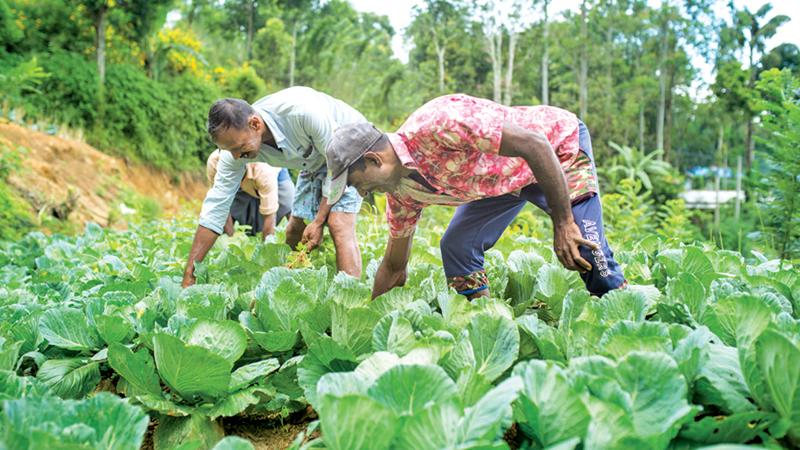
The Food and Agriculture Organisation (FAO) has taken a market based approach in implementing theSustainable Land Management (SLM) program in the central highlands.
FAO, Rehabilitation of Degraded Agricultural Lands Project (RDALP) Project Manager Nimal Gunasena said past experiences have shown that implementing SLM through laws and regulations, raising awareness and educating farmers and providing subsidies are not sufficient.
“The new approach will ensure an increase in land productivity, higher yield and higher income to farmers. Over the past two years of implementing the project, we have seen that this new approach is successful in vegetable cultivation, tea small holdings, dairy farming and home gardening,” he said.
He said the campaign to rehabilitate degraded agricultural lands in the central highlands is focused on educating and encouraging farmers on how to increase their farm income and not directly on soil conservation. Agriculture has not been a lucrative venture in Sri Lanka due to many reasons. Among them land degradation is a major issue. It has been estimated that nearly one third of the land in the country is subjected to soil erosion. Soil erosion and soil fertility decline are the two main types of land degradation observed in the central highlands.
About 50 percent of agricultural lands in the central highlands have already been degraded. Severe erosion takes place on sloping lands under market gardens (vegetables and potatoes), tobacco, poorly managed seedling tea and chena (slash and burn) cultivation.
Land degradation has been threatening the potential of agro-ecosystems in the area to provide global environmental benefits and to sustain economic activities and livelihoods of people depending on ecosystem goods and services. Reversing land degradation by applying SLM will help make agriculture a profitable venture.
“Our interventions are in three districts, Kandy, Nuwara Eliya and Badulla where land degradation is most serious. In the long-term, sustainability of land management, good market price and more income from the unit of land are important,” he said.
With increasing concern on healthy food, sustainability of the ecosystem, responsible and sustainable practices has created demand for various branded agricultural commodities such as organic food and green food which fetch a higher market price and stable demand in local and international markets.
This emphasises the importance of certification of agricultural products. The RDALP has begun discussions with the Department of Agriculture to combine SLM with the Good Agriculture Practices (GAP) program of the Department.
GAP is to be applied for sustainable production of fruits and vegetables. It is a legally compliant, environmentally sound, socially acceptable and economically viable process that ensures quality produce suitable for human consumption.
Since most of the criteria in GAP certification comply with SLM practices the RDALP has recognised that supporting farmers for GAP certification can be used as another market based approach to encourage farmers to implement SLM.
Some issues have been observed in the promotion of GAP certification among the farmers. The local market demand for GAP certified products is still limited. However, this will change gradually with continuous awareness and a growing middle class. RDALP supports supply side and demand side of the GAP program.
“We link leading supermarket chains with groups of farmers interested in obtaining GAP certification and engage with RDALP using SLM. The unavailability of continuous supply is another issue in finding markets. As the high initial cost of GAP certification is another factor that makes farmers reluctant to join the GAP program, the RDALP will support farmers financially.
“We need to start GAP certification with a large number of progressive farmers involved in SLM practices with RDALP and link them to leading supermarket chains in the country or support farmers willing to get GAP certification and adopt SLM practices, Gunasena said.
RDALP was launched in March 2016 at a cost of US$ 11,234,657 with USD 1,344,657 provided by GEF, USD 9,740,000 co-financing by the Government and USD 120,000 by the FAO. The objectives of the project are to reverse and arrest land degradation in agricultural lands in the Kandy, Badulla and Nuwara Eliya districts and to increase the provision of ecosystem goods and services and enhance food security in the central highlands through the promotion of SLM.
